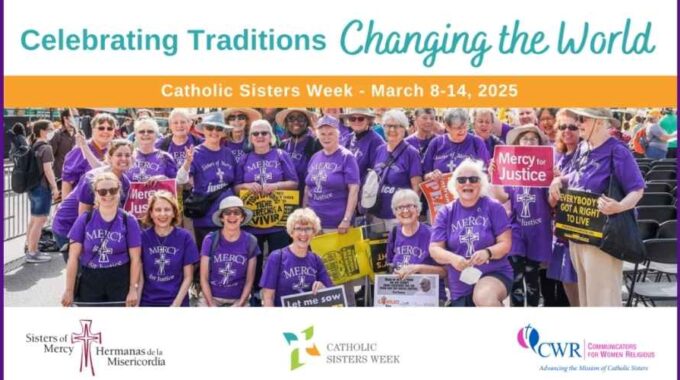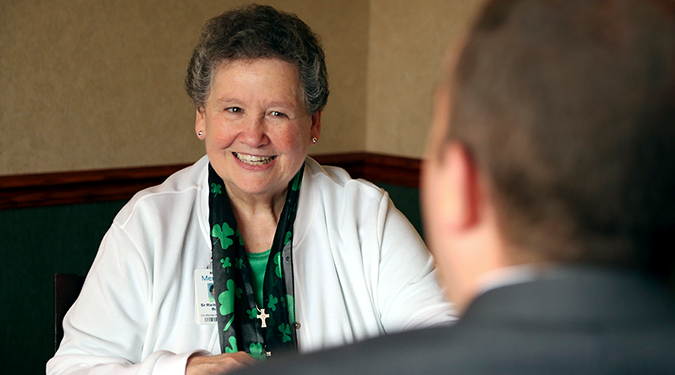From the Institute Justice Team: "In light of the presidential administration's focus on mass deportations…
Interview with David Levy – Entrevista con David Levy
1.
Interview with David Levy – Entrevista con David Levy
In each issue of Around the Table, we’ll provide a “getting to know you” profile of each member of the MESA Board of Directors. For our inaugural profile, we feature Dr. David Levy, of Omaha, Nebraska. A graduate of Purdue University, David is a professor at Bellevue University, where he directs the MBA program and teaches courses in supply chain management, decision sciences, and operations management. He and his wife of 40 years and their three children have a long and deep involvement with Mercy schools. Read on to find out more about this MESA leader.
- How did you come to be named to the MESA board?
That is a good question. I am still not sure who nominated me for consideration as a Board member. If I had to guess, I was nominated because of what others have seen of me through my involvement with Mercy Omaha as a parent, being on the Board and also as chair of the Board. I have also had the opportunity of experience with the Sisters of the West Midwest.
To provide some additional perspective about me, I am not Catholic. In fact, I am of the Jewish faith. I am what would be considered a reform Jew. Furthermore, I grew up in the city of Waco, Texas, which has a small Jewish population, so most of my friends were not Jewish. My weekly faith participation, however, is through our local Catholic church. Here is where I practice my faith as I attend each week. I also have always supported our children in their Catholic formation. In addition to our daughter going to Mercy, our two sons went to one of the all-boys Catholic schools in Omaha. I have always been involved in their schools and our parish, having been on the parish council for two years and its president for one year, many years ago.
One other item is that perhaps my interest in personality profiles may be another reason I was nominated. If you have the chance, look at the Emergenetics.com website. I am a certified associate and provide workshops on this. It reflects who I am: someone who recognizes that everyone is different and this outlook plays a role in everything I do.
I am not myself a product of a Mercy school. However, one might consider me as a product of a Mercy school if you consider my wife of soon-to-be 40 years went to Mercy Omaha. Our daughter is a 1997 graduate of Mercy Omaha. My wife’s four sisters went there as well. My mother-in-law went to Mercy Omaha’s predecessor school. I have had four nieces go there as well. I was a board member for seven years before joining the MESA Board, and I was president the last three years. I believe this might classify me as a product of a Mercy school.
- What are the differences and similarities of being a part of the governance of Omaha and now the entire system?
I spent seven years on the board in Omaha, so this experience and time has given me an understanding and foundation for what is involved in the operations and workings of a Mercy school. Obviously MESA is just in the beginning stages. Governance at this level, however, is much more involved and complex than governance of a single school. There is clearly a higher level of responsibility that each of us has. A year ago when we were having discussions about forming MESA, I realized this first board could play a big role in shaping and forming the system. I gladly take on that responsibility. Knowing what the schools have done for my family, I felt if I can help perpetuate that, I’d feel like I’ve accomplished something.
- Say more about that. Tell us about the transformation that occurred because they went to Mercy schools.
With our daughter, my wife, and her sisters, I watched how service became so important to them. When our daughter was in college she participated in service trips during their spring breaks, often organizing and leading them. Much of this interest and ability came from her preparation while at Omaha Mercy. Having been a part of my wife’s family for so long, I have seen how much they gave of themselves—it means so much to them. Their lives have not been just about how much money they can make for themselves. They all give in different ways, and none of them do it for the recognition. My wife does many things without any recognition. For example, we have a pantry in North Omaha that has a coat drive every winter. My wife spends all year going around looking for bargains at all the stores for coats and winter clothes. All of her sisters, and her brother, do these types of things without expecting anything in return. They are all successful in their work lives, too, and they all have successful marriages and successful children. I have one son who is an attorney who gave up his practice because he wanted to help people. My other son is a pediatrician who is involved in a significant volunteer operation in Nepal helping with prenatal and newborn care. I give my wife most of the credit. And obviously much of it was due to the foundation she developed at Omaha Mercy. It’s instilled a lot of what we see in all of our children.
- Being the MBA program director at Bellevue University must bring a tremendous skillset to our board. Talk about that.
I think this gives me the perspective of what is required for students coming out of high schools today who want to join the business community. I can add the academic perspective at the next level to the MESA board. In addition, Bellevue has a big presence in online teaching so I can add that perspective as well.
- At the time of this interview, you are in China. Why are you there?
Bellevue has a partnership with a university in China, Guangzhou College of Commerce (GCC). The students spend two years in China getting their foundational skills. All of the courses are taught in English. Then they come to Bellevue University for their last two years. They will earn either supply chain management or international business degrees. I have taught students in the past at Bellevue during their last two years. The leadership of GCC asked for a Bellevue faculty member to come and teach at GCC this fall. Because of my past teaching, I suppose the respect and involvement I have had with the students I have taught and the administrators of GCC with whom I have interacted, our university president asked that I be the one to come this year. I will be here teaching for 10 weeks. I also taught the students here through an online platform for a week before coming here. I also spent a month here last year but did limited teaching.
- What message would you like to share with the entire MESA community? What are your hopes for how MESA will unfold over time?
I have always been impressed with the Mercy system. I have seen what this has provided my wife and her siblings. This is not only from an academic basis but in terms of their service, their faith, and overall development. I have also seen the wonderful opportunities that Mercy provided our daughter and I’ve proudly witnessed her growth.
I have also been quite impressed with the leadership of the Mercy Omaha school. As I went through the initial meeting last October in Chicago when the MESA Board was being formed, I was so impressed with the vision that the Institute Leadership Team and the other Mercy system leadership showed there and continue to show. There is an obvious vision for the future of Mercy. The leadership knows there will come a time when there will not be as many Sisters involved, and they are planning for this. We all want Mercy to continue. They also realize that in our changing environment and society that others have talents that can be of value. Obviously, there is no pride of ownership. The critical issues facing society and Mercy have been identified, and we recognize their importance. Most of all, the primary focus remains on the overall development of the students, including faith, education, and service.
Our role at MESA is going to bring more involvement with the school boards in the near-term. This is a new way of working for us. My vision for the future is continuing what the Sisters have started and have been very successful at. I envision of future of addressing the Critical Concerns and not steering away from them, and ultimately all of us coming together as a unified organization and taking the system to the next level.
- Anything else to share?
I just want to wish everybody a happy holiday season. I hope that everyone takes the time to really think about what the meaning of it is, and that they spend as much time in this reflection as they do in all the other aspects of the season. Really look at it from a faith-based perspective and not from the commercialism of it.

En cada edición de «Around the Table» (Alrededor de la Mesa), proporcionaremos el perfil «llegar a conocerte» de cada miembro de la Directiva de Administradores de MESA. Para nuestro perfil inaugural, presentamos al Dr. David Levy, de Omaha, Nebraska. Graduado de la Universidad Purdue, David es profesor en la Universidad Bellevue donde dirige el programa de MBA e imparte cursos sobre gestión de la cadena de suministros, ciencias de la decisión y gestión de operaciones. Él y su esposa de 40 años y sus tres hijos tienen una participación extensa y profunda con las escuelas de la Misericordia. Continúe leyendo para que conozca más sobre este líder de MESA.
- ¿Cómo llegó a ser nombrado para la directiva de MESA?
Es una buena pregunta. Aún no estoy seguro quién me nominó para consideración como miembro de la Directiva. Si tuviera que adivinar, fui nominado por lo que han presenciado de mí a través de mi participación en la Misericordia de Omaha como padre, en la Directiva y también como presidente de la Directiva. Además, he tenido la oportunidad de experimentar con las Hermanas de la Comunidad Oeste Medio Oeste.
Para darles información suplementaria sobre mí, les diré que no soy católico. De hecho, soy de la fe judía. Soy lo que se podría considerar un judío reformista. Además, crecí en la ciudad de Waco, Texas, que tiene una pequeña población judía y por eso la mayoría de mis amigos no eran judíos. Sin embargo, mi participación semanal en la fe es por medio de nuestra iglesia católica local. Aquí es donde practico mi fe mientras asisto cada semana. También siempre apoyé a nuestros hijos en su formación católica. Aparte de nuestra hija asistiendo a la Misericordia, nuestros dos hijos fueron a una escuela católica para varones en Omaha. Siempre me involucré es sus escuelas y en nuestra parroquia donde formé parte del consejo parroquial por dos años y como su presidente por un año, hace muchos años.
Otra cosa es que tal vez mi interés en los perfiles de personalidad pueda ser otra razón por la que fui nominado. Si tiene la oportunidad, vea el sitio web Emergenetics.com. Soy un asociado certificado y ofrezco talleres sobre esto. Eso les muestra quien soy: alguien que reconoce que cada persona es diferente y esta perspectiva juega un rol en todo lo que hago.
No soy un producto de una escuela de la Misericordia. No obstante, podrían considerarme como un producto de la escuela de la Misericordia si consideran a mi esposa que pronto cumplirá 40 años y asistió a la Misericordia de Omaha. Nuestra hija se graduó en 1997 de la Misericordia de Omaha. Las cuatro hermanas de mi esposa también estudiaron allí. Mi suegra asistió a la escuela predecesora de la Misericordia de Omaha. Además, tengo cuatro sobrinas que fueron allí. Fui miembro de una directiva por siete años antes de formar parte de la directiva de MESA, y fui presidente en los últimos tres años. Creo que esto podría clasificarme como un producto de una escuela de la Misericordia.
- ¿Cuáles son las diferencias y similitudes al ser parte del gobierno de Omaha y ahora de todo el sistema?
Pasé siete años en la directiva en Omaha, por lo que esta experiencia y el tiempo me han proporcionado el conocimiento y la base para lo que está involucrado en las operaciones y el funcionamiento de una escuela de la Misericordia. Ciertamente, MESA está apenas en la etapa inicial. Sin embargo, la gobernanza en este nivel es mucho más complicada y compleja que la gobernanza de una sola escuela. Evidentemente, hay un mayor grado de responsabilidad que cada uno asume. Hace un año, cuando debatíamos sobre la formación de MESA, me di cuenta que esta primera directiva podría desempeñar un rol importante en la elaboración y formación del sistema. Será un placer asumir esa responsabilidad. Sabiendo lo que las escuelas han hecho por mi familia, comprendí que si yo podía ayudar a perpetuarlo, me sentiría como si hubiera alcanzado algo.
- Diga más sobre ese tema. Relátenos acerca de la transformación que se produjo porque asistieron a las escuelas de la Misericordia.
Con nuestra hija, mi esposa y sus hermanas, yo observé cómo el servicio llegó a ser muy importante para ellas. Cuando nuestra hija fue a la universidad, ella participó en viajes de servicio durante sus recesos de primavera, con frecuencia los organizó y dirigió. Gran parte de este interés y habilidad resultó de su preparación en la Misericordia de Omaha. Habiendo sido parte de la familia de mi esposa por tanto tiempo, he visto cuanto han compartido de sí mismas — ello significa mucho para ellas. Sus vidas no han sido solo acerca de cuánto dinero pueden ganar para sí mismas. Todas ellas dan de diferentes maneras, y ninguna de ellas lo hace por el reconocimiento. Mi esposa hace muchas cosas sin ningún reconocimiento. Por ejemplo, nosotros tenemos una despensa en el norte de Omaha que recolecta abrigos para los necesitados cada invierno. Mi esposa se pasa todo el año buscando ofertas de abrigos y ropa para invierno en todas las tiendas. Todas sus hermanas, y su hermano, hacen este tipo de obras sin esperar nada a cambio. Todas tienen mucho éxito en sus vidas laborales y también tienen matrimonios e hijos exitosos. Yo tengo un hijo que es abogado y dejó su práctica porque deseaba ayudar a la gente. Mi otro hijo es pediatra y participa en una importante operación de voluntarios en Nepal que asiste en el cuidado prenatal y del recién nacido. Le doy a mi esposa la mayor parte del mérito. Y claramente gran parte se debió a la formación que desarrolló en la Misericordia de Omaha. Está muy inculcado en lo que vemos en todos nuestros hijos.
- Ser el director del programa de MBA en la Universidad Bellevue debe traer un inmenso conjunto de conocimientos a nuestra directiva. Hable sobre ello.
Pienso que esto me da la perspectiva de lo que se requiere para los estudiantes que se gradúan de las escuelas secundarias hoy en día y desean ser parte de la comunidad de negocios. Puedo agregar la perspectiva académica en el siguiente nivel a la directiva de MESA. Además, Bellevue tiene una importante presencia en la enseñanza en línea, así que puedo agregar esta perspectiva también.
- En el momento de esta entrevista, se encuentra en China. ¿Porque está allá?
Bellevue, está asociada con una Universidad en China, Guangzhou College of Commerce (GCC). Los estudiantes pasan dos años en China obteniendo sus conocimientos fundamentales. Todos los cursos se enseñan en inglés. Después, asisten a la Universidad Bellevue para sus dos últimos años. Ellos obtendrán su título en gestión de la cadena de suministros o gestión empresarial internacional. Anteriormente, enseñé a los estudiantes en Bellevue durante sus últimos dos años. El liderazgo de GCC requiere que un miembro docente de Bellevue vaya y enseñe en GCC este otoño. Debido a mis enseñanzas pasadas, el respeto y participación que he obtenido con los estudiantes a los que he enseñado y los administradores de GCC con los que he interactuado, nuestro presidente de la universidad me pidió que yo sea el que vaya este año. Estaré enseñando aquí por 10 semanas. También, les enseñé a los estudiantes (de GCC) por medio de una plataforma en línea durante una semana antes de venir aquí. También, estuve aquí por un mes el último año pero enseñé muy poco.
- ¿Qué mensaje le gustaría compartir con toda la comunidad de MESA? ¿Cuáles son sus esperanzas sobre cómo se desarrollará MESA en el futuro?
Siempre he estado impresionado con el sistema de la Misericordia. He visto lo que les ha brindado a mi esposa y a sus hermanas. Esto no es sólo desde una base académica, sino en término de su servicio, fe y desarrollo en general. También, he presenciado las oportunidades maravillosas que la Misericordia facilitó a nuestra hija y he atestiguado con orgullo su crecimiento.
Me siento muy impresionado con el liderazgo de la escuela de la Misericordia de Omaha. Al asistir a la reunión inicial el pasado mes de octubre en Chicago cuando la Directiva de MESA se estaba estableciendo, me impresionó la visión que el Equipo de Liderazgo del Instituto y el otro sistema de la Misericordia de liderazgo demostraron y continúan mostrando. Hay una aparente perspectiva para el futuro de la Misericordia. El liderazgo tiene conocimiento que llegará un día cuando no habrá tantas Hermanas involucradas, y ellas están planificando para ello. Todos queremos que la Misericordia continúe. Ellas también se dan cuenta que en nuestro entorno y sociedad cambiante hay otras que poseen talentos que pueden ser valiosos. Obviamente, no existe orgullo de pertenencia. Se han determinado los asuntos críticos que enfrentan la sociedad y la Misericordia y reconocemos su importancia. Sobre todo, el enfoque principal sigue siendo sobre el desarrollo general de los estudiantes, incluyendo la fe, la educación y el servicio.
Nuestra función en MESA va a traer más participación con las directivas escolares en el futuro cercano. Esta es una nueva manera de trabajar para nosotros. Mi visión para el futuro es continuar lo que las Hermanas han empezado y han tenido mucho éxito. Me magino el futuro de abordar los Asuntos Críticos y no alejarnos de ellos, y por último todos nos unimos como una organización unificada llevando el sistema al próximo nivel.
- ¿Algo más para compartir?
Solo quiero desearles una feliz temporada navideña. Espero que dediquen el tiempo para pensar realmente sobre cuál es su significado, y que tomen tanto tiempo en esta reflexión como lo hacen en todos los otros aspectos de la temporada. Véanlo realmente desde una perspectiva basada en la fe y no desde su comercialismo.



